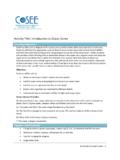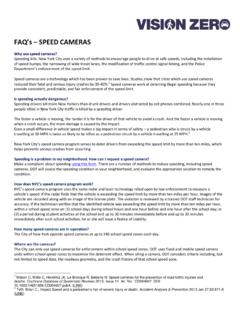Transcription of Gossip-free Zones - Holly Elissa Bruno | Keynotes …
1 Gossip-free Zones Problem Solving to Prevent Power Struggles Holly Elissa Bruno When we have concerns about the professional Imagine a workplace where behavior of a co-worker, we shall first let that per- The well-being of children and families is the focus of everyone's son know of our concern in a way that shows respect attention. for personal dignity and for the diversity to be found among staff members, and then attempt to resolve Every employee looks forward to work. the matter collegially and in a confidential manner. Staff members discuss conflicts respectfully and negotiate solutions.
2 NAEYC's Code of Ethical Conduct ( ) Children learn by observing us. Adults who gossip about and exclude others model destructive behavior for children. gossip can also harm parents like Orlando's mother; their trust in the profession- Janice, alism of the program is compromised. who dislikes the pro- gram director, Elena, whispers to her co-teacher that Elena is get- What is gossip ? ting rich at the program's expense by tak- ing long lunches, going on a Caribbean cruise, gossip is discussion of a personal or intimate nature, often about and paying staff low salaries.
3 Janice complains someone who is not present and with the intent of harming that per- that Elena is an incompetent fiscal manager; Jan- son's reputation. Listening to gossip is gossiping. Sharing accurate, ice knows the payroll has been almost late every necessary information or holding an opinion about another person is week. Girls in Janice's classroom imitate her ani- not gossiping. mated whispering. Today Janice tells Orlando's Some people use gossip to gain and maintain power, at the expense mother that she is scared her paycheck will be of community.
4 By sabotaging Elena's leadership, Janice diminishes late. Janice expects her coteacher to side with the director's effectiveness, putting Janice in charge in many ways. her against Elena. Whenever Elena visits the classroom, Janice smiles sweetly and treats Elena as if she were her best Holly Elissa Bruno , MA, JD, teaches early childhood management courses friend. What can the co- for Wheelock College and heads Bruno Duraturo Keynotes and Consulting teacher do? in the Boston area, specializing in early childhood leadership and the law.
5 A. former dean and associate professor at University of Maine Augusta, she served as assistant attorney general for the state of Maine. E-mail: 1, 3, 10 Photos Ellen B. Senisi. Illustration Diane Greenseid. 26 Young Children September 2007. CHILDREN AND ADULTS. AS PROBLEM SOLVERS. A coup d'etat takes place beneath the radar screen. Program Groups of people who have been forbidden direct access quality and morale plummet. to power by law or by custom often compensate by using indirect means such as gossip . Researchers Woolsey and McBain note, Women who feel powerless tend to disguise An invitation their rising hostility.
6 They do not attack openly. They do not acknowledge their own backbiting and gossiping or This article is an invitation to choose professionalism the harmful consequences of their prolonged avoidance of over gossip and negativity. Leaving behind covert dynam- conflict (1987). Gossipers lack the skill, confidence, and ics ( gossip ) makes room for aboveboard, mutual problem perhaps motivation to confront another person. gossip is a solving as envisioned in NAEYC's Code of Ethical Conduct habit that can become almost an addiction we feel we have (2005).
7 Early childhood educators can share an abundance to lie about or deny. Reversing habits and addictions effec- of uplifting, collegial, productive dynamics; gossip under- tively requires a sustained, systemic, community effort. mines these capacities. We have the power to create, imple- ment, and enforce policies and procedures to shoo gossip and negativity out the door. gossip in early childhood programs Why do some people gossip ? Do our early childhood colleagues identify gossip as a concern? To find out, I queried more than 700 early child- Research shows that men may be neurologically wired hood professionals across the country.
8 Respondents were to deal with conflict differently than women (Cahill et al. women and men representing urban and rural programs 2004). Confrontations between men are typically direct, and coming from culturally diverse backgrounds. I queried aggressive, and aimed at determining who has the greater these professionals at the onset of meetings or workshops status. Anthropologist Marjorie Harness Goodwin notes I held with each group. Most of the workshops were offered that once young men have completed conflict, they quickly at professional conferences for groups such as NAEYC, move on (Goodwin 1990).
9 Women, on the other hand, tend NBCDI (National Black Child Development Institute), and to avoid direct confrontation, instead choosing to seek sup- state and regional Head Start associations. I asked partici- port from other women (Tannen 1991). gossip is avoidant pants to complete the following sentence in any way that behavior. Janice expresses her resentment toward Elena reflected their experience: When women work with indirectly, without confronting her face-to-face. She gossips, women _____. (You might wish to take a moment perhaps because she does not know how to express her to fill in the blank.)
10 Views in person. According to Bruno and Copeland (1999), 80 per- cent of early childhood leaders are conflict avoid- ant; we fear direct confrontation. Many of us pre- fer to believe that problems eventually go away. Center directors and other supervisors hope staff will magically get the message to improve perfor- mance by observing how supervisors do things. Jamilah R. Jor'dan, founder and president of the Partnership for Quality Child Care in Chicago, observes, One aspect of the avoidance behav- ior is that we see, but we do not see.







